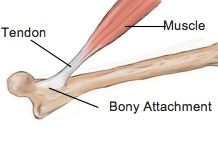
Tips for Managing Tendon Injuries
Tendons, the soft connective tissues that join muscles to bone and are known for being notoriously difficult to treat once injured. The reason for this is that often they are injured through stress or overuse, and compared to muscles have relatively small blood flow, which is essential for healing.
Tendons and muscles work together to move your joints and are called a contractile unit. As muscles are exercised and gain strength, the attaching tendons are also placed under tension and adapt to this to become stronger. If the load placed on the tissues exceeds their capacity, the tendon fibres can begin to break down and become stiff and painful.
Is my pain related to a tendon injury?
For an accurate diagnosis, you will need to be assessed by a physiotherapist. However, some signs that your pain might be coming from an in issue with your tendon are;
· The pain is quite specific and can be felt over the tendon itself.
· The pain is worse when under stress and improves when rested.
· The pain improves after exercise has started, but it might be worse the day after.
· The area around the tendon may feel stiff after periods of rest, particularly in the morning.
How are tendon injuries treated?
When it comes to recovery, tendons are often treated differently to other injuries. While each tendon injury is unique and will require assessment and intervention by a physiotherapist, there are a few general approaches that usually help with all tendon injuries.
Reducing your activity to a comfortable level is the first step to recovery. Complete rest can actually delay healing as the tendon simply becomes weaker and less able to cope with subsequent loads. Your physiotherapist can provide you with a targeted exercise program to aid your recovery. Eccentric exercises, which are exercises that work alongside gravity, have been shown to stimulate tendon healing and strength.
Stretching may aggravate your injury and should be used with caution. Assessment of any biomechanical faults or stresses that are placing undue load on the tendon is also a central component of treatment. Your physiotherapist is able to guide you with your recovery and return to sport to avoid aggravating any injury.
The information in this newsletter is not a replacement for proper medical advice. Always see a medical professional for an assessment of your condition.
Physio Direct is ACC accredited so you can come to us directly to get an injury registered with ACC without having to go to your GP first, followed by an assessment, treatment and follow up review, to ensure correct care and recovery. Physio Direct can also refer you directly for Cortisone injections, X-Rays and Ultra Sound Scans and on to Specialists if needed.
Please feel free to print out these news letters and put the in the staffroom and hand them out to your team. Understanding more about injuries, gives people the power to prevent an injury from occurring in the first place. Prevention and education is the key!
